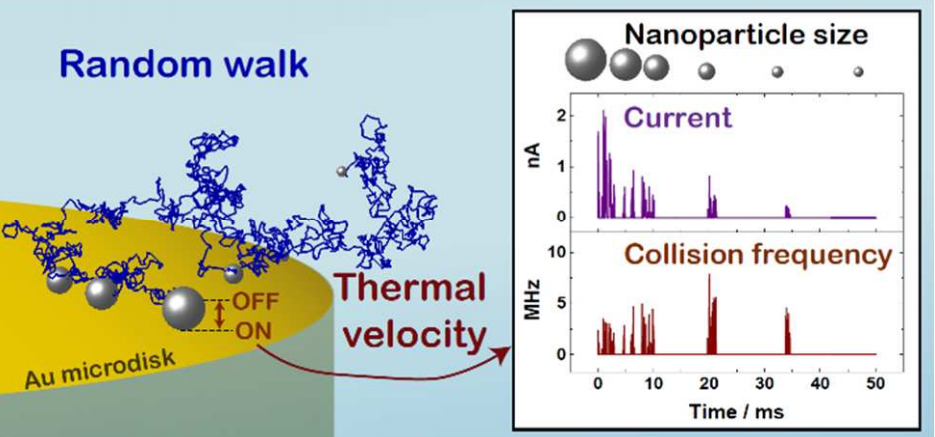Modelling Experimental Systems
For the systems investigated in the White group the experimentally measured quantity is most typically the current, or a statistical measure derived from it, whereas our interest usually lies in the underlying physical and chemical phenomena. Interpretation of our data is typically underpinned by a theoretical model of the system, which may be an analytical expression or a numerical calculation, relating the measured quantity to one or more physical quantities. Often no model of the system we are studying exist and we develop one. Typical problems include, for instance, relating electron-transfer rates with the local electrostatic potential distribution, computing the forces of a nanoparticle and its resulting velocity, or studying the effect of ion transport in confined spaces on the discharge rate of a 3D battery.
As well as allowing us to go from an experimentally measured quantity to a physical quantity, models also allow us to ask “what if…?” questions of our experiments. We can effectively prototype experiments to deduce whether we are likely to be sensitive to a particular effect. This also allows us to investigate the propagation of uncertainties in our work.
We use the commercial finite element package Comsol Multiphysics to build and solve numerical models that describe multiple interacting physical processes; such as electric fields, fluid flow, and the transport of species in solution though a combination of diffusion, electromigration and convective transport. Below are select publications showcasing a number of theoretical models that the White group has developed.
Selected Publications:
Electric Potential-Driven Acid/Base Chemistry: Kinetics of Electrochemical Interfacial
Proton Transfer and Transport
Pendergast, A.D., Levey, K.J., Macpherson, J.V., Edwards, M.A. and White, H.S.,
The Journal of Physical Chemistry C, 2024, 128(17), 7127-7136.
Double-Layer Inhibition of Peroxydisulfate Reduction at Mercury Ultramicroelectrodes.
A Quantitative Analysis of the Frumkin Effect Including Molecular Transport and Long-Range
Electron Transfer
Pendergast, A.D. and White, H.S.,
The Journal of Physical Chemistry C, 2023, 127(23), 11283-11297
Simulation of the cyclic voltammetric response of an outer-sphere redox species with
inclusion of electrical double layer structure and ohmic potential drop
Levey, K.J., Edwards, M.A., White, H.S. and Macpherson, J.V.,
Physical Chemistry Chemical Physics, 2023, 25(11), 7832-7846
Finite Element Modeling of the Combined Faradaic and Electrostatic Contributions to
the Voltammetric Response of Monolayer Redox Films
K. J. Levey, M. A. Edwards, H. S. White, and J. V. Macpherson
Anal. Chem. 2022, 94(37), 12673-12682
Nanopore Opening and Flat and Nano-Tip Conical Electrodes during Vesicle Impact Electrochemcial
Cytometry
X. Li, Lin Ren, J. Dunevall, D. Ye, H. S. White, M. A. Edwards, and A. G. Ewing
ACS Nano, 2018, 12(3), 3010–3019
Collision Dynamics During the Electrooxidation of Individual Silver Nanoparticles
D. A Robinson, Y. Liu, M. A. Edwards, N. J. Vitti, S. M. Oja, B. Zhang, H. S. White
J. Am. Chem. Soc., 2017, 139(46), 16923–16931
Voltage-Rectified Current and Fluid Flow in Conical Nanopores
W. Lan, M. A. Edwards, L. Luo, R. T. Perera, X. Wu, C. R. Martin, and H. S. White
Acc. Chem. Res., 2016, 49(11), 2605–2613.
Ion Transport within High Electric Fields in Nanogap Electrochemical Cells
J. Xiong, Q. Chen, M. A. Edwards, and H. S. White
ACS Nano, 2015, 9(8), 8520-8529.
Effect of Surface Charge on the Resistive Pulse Waveshape during Particle Translocation
through Glass Nanopores
W. Lan, C. Kubeil, J. Xiong, A. Bund, and H. S. White
J. Phys. Chem. C. , 2014, 118(5), 2726-2734.
Negative Differential Electrolyte Resistance in a Solid-State Nanopore Resulting from
Electroosmotic Flow Bistability
L. Lou, D. A. Holden, and H. S. White
ACS Nano. , 2014, 8(3), 3023-3030.
Electrogeneration of Single Nanobubbles at Sub-50-nm-Radius Platinum Nanodisk Electrodes
L. Luo and H. S. White
Langmuir, 2013, 29(35), 11169-11175.

